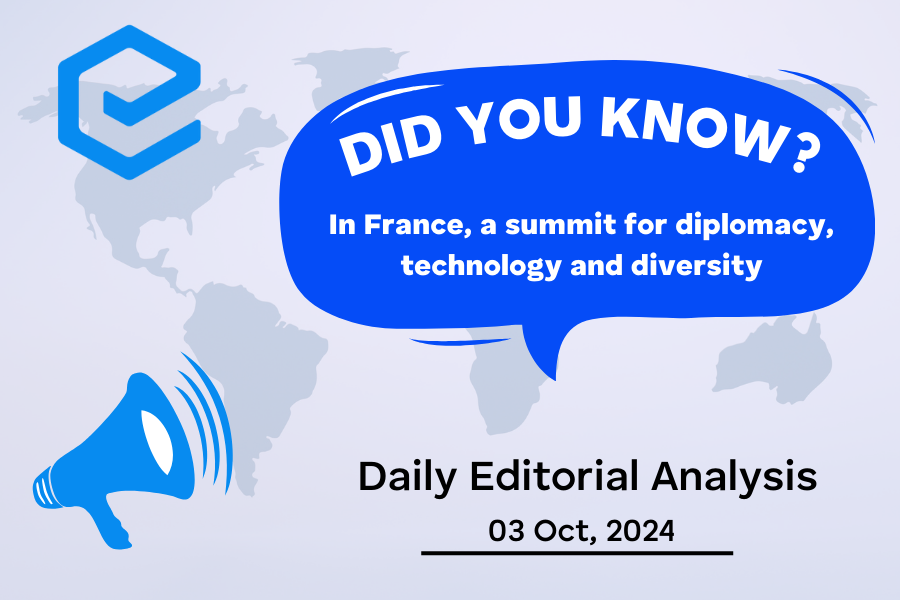In France, a unique summit is bringing together leaders from across the globe to discuss the intersection of diplomacy, technology, and diversity. This event aims to explore how technological advancements can shape international relations and foster global cooperation. It also focuses on the importance of embracing diversity in decision-making and policy development. By addressing these topics, the summit seeks to create a platform for innovation, collaboration, and inclusivity, helping nations to navigate the challenges and opportunities of a rapidly evolving world. The gathering highlights France’s commitment to promoting dialogue on crucial global issues.

Contents
- 0.1 Why in the news?
- 0.2 Key Issues:
- 0.3 The main topics include:
- 0.4 Francophonie Summit and its relevance:
- 0.5 The Organisation Internationale de la Francophonie
- 0.6 Digital Technology and Artificial Intelligence
- 0.7 Conclusion
- 1 To get free counseling/support on UPSC preparation from expert mentors please call 9773890604
Why in the news?
France is set to host the 19th Francophonie Summit on October 4-5, 2024. The summit will convene over 100 Heads of State, government officials, and high-ranking representatives. The venues include Paris and Villers-Cotterêts, the city where King François I established French as the official language in 1539.
Key Issues:
The summit will tackle significant international issues relevant not only to French-speaking countries but also to many non-French-speaking nations, particularly India.
The main topics include:
- Renewal of multilateralism
- Major digital challenges related to Artificial Intelligence (AI)
- Promotion of cultural and linguistic diversity
- Significance of Multilingualism
Francophonie Summit and its relevance:
- The renowned Senegalese President and poet Léopold Sédar Senghor remarked, “Francophonie is the integral Humanism.”
- A primary message of the summit will stress that multilingualism and cultural diversity do not create barriers; instead, they promote beneficial exchanges and collective thought, which should be celebrated.
- In the Indian context of Shared Values: This ethos resonates with the 321 million French speakers worldwide, including those in Puducherry, India, and aligns with India’s priorities.
The Organisation Internationale de la Francophonie
Foundation and Objectives:
- Established in 1970, the Organisation Internationale de la Francophonie (OIF) organises relationships between French-speaking countries.
- Founding figures include notable leaders such as Léopold Sédar Senghor, Habib Bourguiba (Tunisia), Hamani Diori (Niger), and Norodom Sihanouk (Cambodia).
- Goals of the Organization: The OIF aims to promote the French language and enhance cooperation among its 88 Member States and Governments (54 full members, 7 associate members, and 27 observers).
- These goals are articulated in the Charter of La Francophonie, adopted in 1997 at the Hanoi Summit.
- The organisation serves as a forum for discussions and projects among countries with diverse cultures, economies, and political systems, advocating for democracy, peace, and cultural diversity.
Renewing Multilateralism
- In a world increasingly divided, the Francophonie Summit, held every two years, serves as a key moment to determine the future course of the organization. For the first time in 33 years, France will host the summit in 2024, under the theme “Create, Innovate, and Do Business in French.”
- This event will introduce a new model of discussion, giving civil society stakeholders the opportunity to engage directly with summit officials and explore fresh solutions for enhanced cooperation.
- One of the summit’s primary goals is the renewal of multilateralism.
- As French President Emmanuel Macron mentioned in his address at the 79th United Nations General Assembly, the current global governance structures need to evolve.
- France supports the inclusion of India and other G-4 nations as permanent members of the United Nations Security Council to make international institutions more representative and efficient.
- Macron has also called for comprehensive reforms to the World Bank and the International Monetary Fund to better support nations in the Global South, recognizing the changing dynamics of the world economy and population growth.
Digital Technology and Artificial Intelligence
- A major focus of the summit will be digital technology, particularly the rise of Artificial Intelligence (AI), which has revolutionised modern society.
- While AI presents new opportunities, it also raises critical questions about the protection of cultural diversity and the rights of citizens in their native languages. AI can be leveraged to promote linguistic diversity by enhancing translation tools and enforcing language rights.
- To further explore these issues, France will host the AI Action Summit in February 2025, following up on discussions from the Francophonie Summit.
- Additionally, the first FrancoTech Fair will bring together over 150 exhibitors to address challenges such as energy transition, education, and human capital development, offering opportunities for collaboration between innovators, including young talent from India.
Conclusion
The Francophonie Summit will highlight shared interests between France and India in areas like multilateralism, innovation, AI, and cultural diversity. Upcoming events like the AI Action Summit in 2025 and the India-France Year of Innovation in 2026 will provide platforms to strengthen these collaborations and advance global solutions in these critical areas.
To get free counseling/support on UPSC preparation from expert mentors please call 9773890604
- Join our Main Telegram Channel and access PYQs, Current Affairs and UPSC Guidance for free – Edukemy for IAS
- Learn Economy for free- Economy for UPSC
- Learn CSAT – CSAT for UPSC
- Mains Answer Writing Practice-Mains Answer Writing
- For UPSC Prelims Resources, Click here

